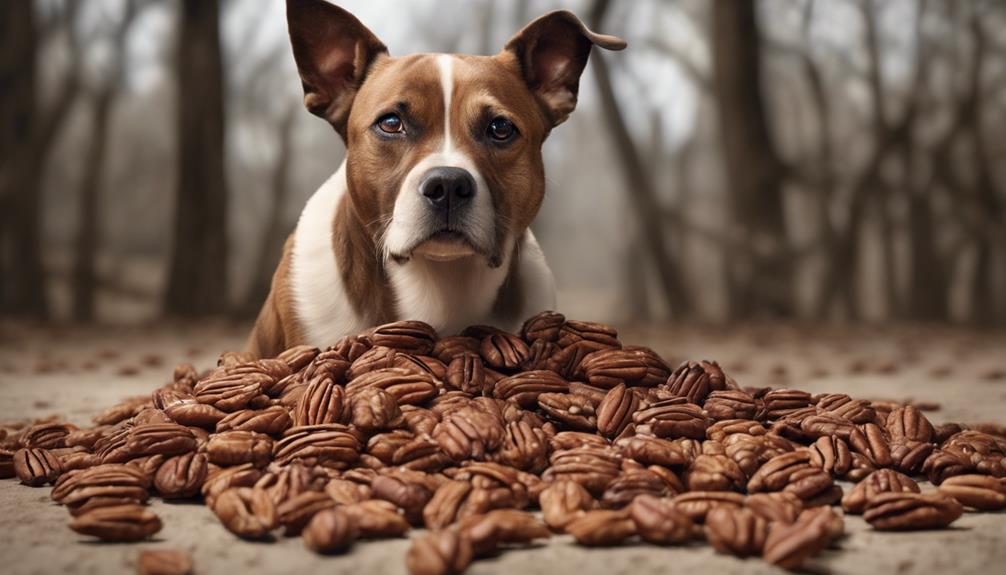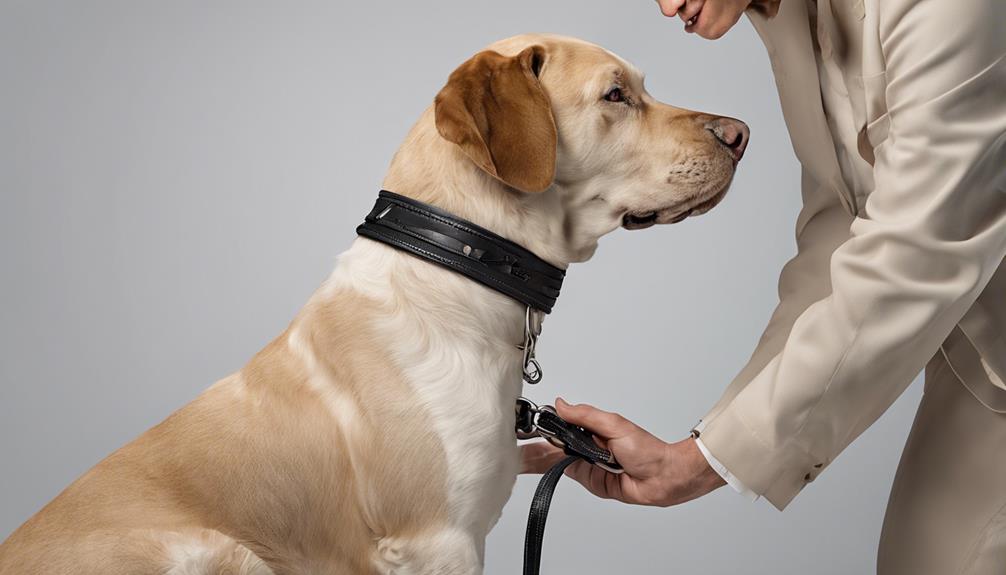Pecans are risky for dogs. The high fat can cause tummy troubles like pancreatitis. Obesity is a worry with too many nuts. Watch for signs of blockages, mold, and toxic juglone. Severe issues like tremors can arise, needing urgent vet help. Consult a vet before giving pecans. They safeguard your dog's well-being. Symptoms to heed: vomiting, lethargy, and poor appetite point to danger. Avoid pecans to guarantee health. Seeking vet support right away is key to canine safety. Explore more to stay informed about your dog's health.
Key Takeaways
- Pecans can trigger digestive distress and pancreatitis in dogs due to their high-fat content.
- Excessive consumption can lead to obesity in dogs, necessitating monitoring and limitation.
- Toxicity concerns arise from juglone and mold on pecans, causing severe health issues.
- Symptoms of intestinal blockages include vomiting, lethargy, and loss of appetite, requiring immediate vet attention.
- Consulting a veterinarian is crucial for personalized advice, symptom monitoring, and preventive care.
Potential Digestive Issues
Pecans can trigger digestive distress in dogs, potentially causing vomiting and diarrhea due to their high-fat content. Dogs may struggle with pecans' high-fat content, leading to gastrointestinal distress like pancreatitis or gastroenteritis.
The fiber and fat in pecans can be tough for a dog's stomach to handle, possibly resulting in serious digestive problems if consumed in large quantities. It's important to keep pecans away from our furry friends to prevent stomach upset and discomfort.
If a dog accidentally eats pecans and shows signs of digestive issues, it's vital to contact a vet immediately for guidance. Remember, our canine companions rely on us to keep them safe and healthy, so being mindful of what they eat is crucial.
Let's make sure our dogs stay happy and energetic by avoiding foods like pecans that can cause digestive problems.
Risk of Obesity
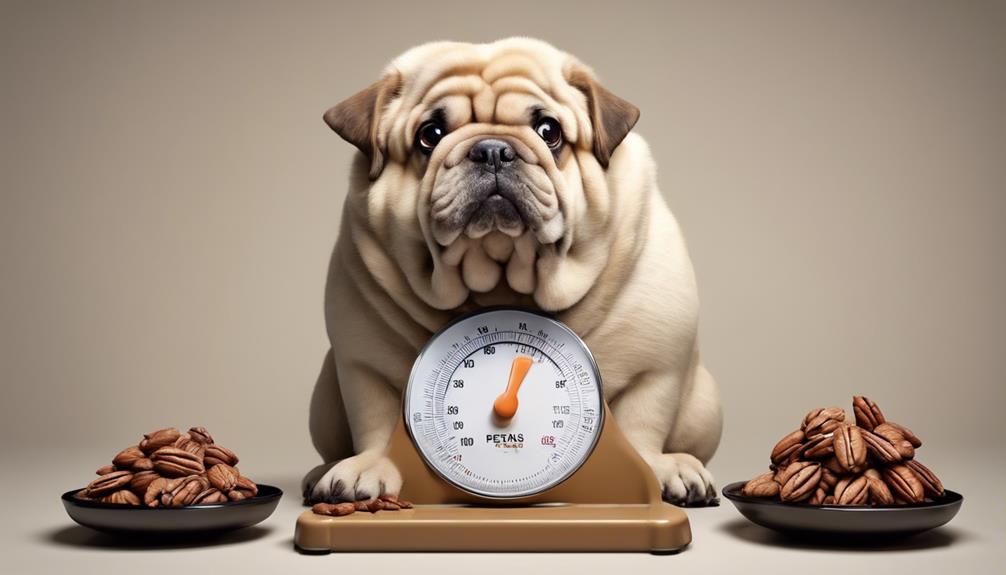
Excessive consumption of high-fat nuts like pecans can greatly contribute to obesity in dogs, posing a serious risk to their overall health. Obesity in dogs can stem from weight gain caused by the high-fat content in pecans, leading to various health issues. To prevent obesity, it is important to monitor and limit your dog's intake of pecans. Maintaining a balanced diet that excludes high-fat nuts like pecans can help your dog achieve and sustain a healthy weight.
| Risk of Obesity | |
|---|---|
| Toxicity | High Fat |
| Obesity | Weight Gain |
| Health Issues | Monitoring |
| Limiting Intake | Balanced Diet |
| Healthy Weight |
It's vital to be aware of the risks associated with feeding pecans to your furry friend. By understanding the potential consequences of obesity from consuming high-fat nuts like pecans, you can take the necessary steps to guarantee your dog maintains a healthy weight through a well-rounded diet.
Pancreatitis Concerns
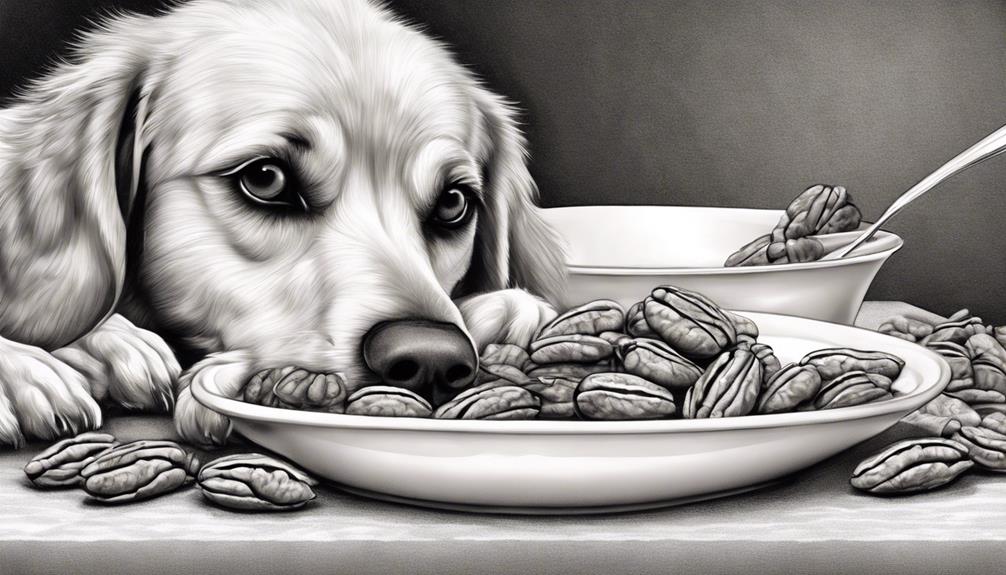
When dogs consume pecans due to their high-fat content, a serious concern arises regarding the risk of pancreatitis. Pancreatitis is the inflammation of the pancreas and can lead to severe health issues for dogs. This condition is considered critical and can even be life-threatening, especially if not addressed promptly. Dogs that consume pecans regularly are at a higher risk of developing pancreatitis due to the high levels of fat present in these nuts.
If your dog ingests pecans and shows signs of pancreatitis such as vomiting, abdominal pain, loss of appetite, or lethargy, it's vital to seek immediate veterinary care. Ignoring these symptoms can worsen the condition and put your dog's health in jeopardy. Veterinarians can provide the necessary treatment to manage pancreatitis and alleviate your dog's discomfort. Hence, it's essential to be aware of the risks associated with feeding pecans to your furry friend and to take quick action if any signs of pancreatitis appear.
Toxicity From Juglone

Avoiding pecans with juglone is vital to prevent toxicity in dogs and horses due to its harmful effects on their digestive systems. Here are some important facts to keep in mind regarding the toxicity from juglone:
- Dogs may suffer from severe vomiting, gastrointestinal issues, and pancreatitis if they consume pecans containing juglone. These symptoms can be distressing and detrimental to their health.
- The presence of juglone in pecans can lead to tremors, seizures, and neurological problems in dogs. These serious issues can have long-lasting effects on their well-being.
- Even if a small amount of pecans with juglone is ingested, it can be harmful to dogs and horses. In such cases, immediate veterinary care is necessary to address the potential toxicity and provide appropriate treatment.
It's essential to be vigilant and prevent pets from accessing pecans with juglone to safeguard their health and well-being.
Dangers of Aspergillus Mold
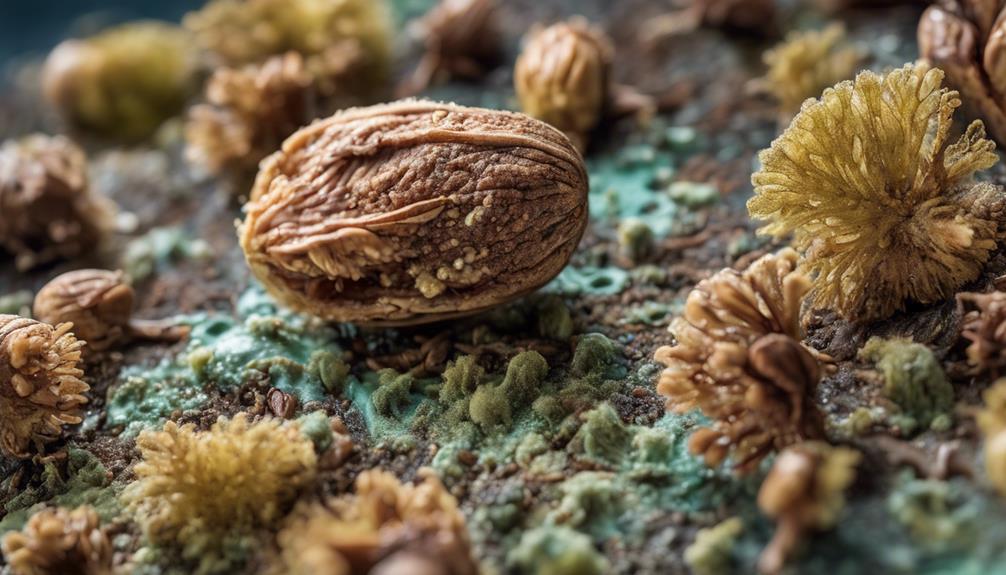
As we explore the dangers of Aspergillus mold on pecans, it becomes apparent that the presence of this mold can pose significant health risks to dogs. Moldy pecans containing Aspergillus mold can produce tremorgenic mycotoxins and aflatoxin, which are toxins harmful to dogs.
If a dog ingests moldy pecans with Aspergillus mold, it can lead to severe symptoms such as tremors, seizures, and neurological issues. Aflatoxin, one of the toxins present in mold on pecans, is particularly toxic to dogs and can cause various health problems. Hence, it's essential for dogs to avoid consuming pecans with Aspergillus mold to prevent potential health complications.
These toxins can have serious consequences on a dog's well-being, affecting their nervous system and overall health. Keeping your furry friend away from moldy pecans is vital to safeguard their health and prevent the development of any poisoning symptoms.
Vomiting and Seizures

When dogs consume pecans, they can experience severe vomiting due to the toxic compound juglone. Additionally, ingesting moldy pecans that contain tremorgenic mycotoxins can lead to seizures in dogs.
Being mindful of these risks is crucial to keep our furry friends safe from the potential dangers of pecans.
Pecans and Vomiting
Consuming pecans can lead to vomiting and seizures in dogs due to their toxic properties, especially when moldy or contaminated with aflatoxin.
- Dogs may experience immediate symptoms of vomiting after ingesting pecans, indicating potential toxicity.
- Seizures can occur in dogs who've consumed moldy pecans containing aflatoxin, necessitating urgent veterinary attention.
- The toxic nature of pecans can result in severe gastrointestinal issues, leading to complications if not addressed promptly.
If your dog shows signs of illness such as vomiting or seizures after eating pecans, it's vital to seek immediate veterinary care to prevent further harm. Remember, the well-being of your furry companion is paramount, so always be cautious about what they consume to keep them safe and healthy.
Pecans and Seizures
In dogs, seizures can be triggered by the consumption of moldy pecans containing tremorgenic mycotoxins. These toxins can lead to severe neurological problems, causing symptoms like vomiting and seizures. Aflatoxin found in contaminated pecans can also induce seizures in dogs. Eating pecans with toxic molds can result in adverse effects, including tremors and seizures. Below is a table illustrating the important connection between moldy pecans and seizures in our furry friends:
| Moldy Pecans | Seizures | Tremorgenic Mycotoxins |
|---|---|---|
| Aflatoxin | Neurological issues | Contaminated pecans |
It's vital to keep pecans away from dogs to prevent these harmful consequences. If your dog shows any signs of seizures or vomiting, consult a veterinarian immediately.
Intestinal Blockage Risks

Pecans pose a serious risk to our furry friends' digestive health. The hard texture and size of pecans can lead to blockages in a dog's intestines, causing severe complications.
If you suspect your dog has ingested pecans and shows symptoms like vomiting or abdominal pain, seek immediate veterinary help to prevent any potential blockages.
Blockage Dangers Explained
Experiencing an intestinal blockage due to pecan ingestion can pose a life-threatening risk to dogs, particularly smaller breeds. When it comes to pecans, here are the dangers explained:
- Critical: The hard texture of pecans can make them challenging for dogs to chew and digest properly.
- Gastrointestinal System: Dogs may struggle to break down pecans, increasing the likelihood of blockages in their gastrointestinal system.
- Immediate Veterinary Attention: If your dog shows symptoms of an intestinal blockage, such as vomiting or abdominal pain, it's critical to seek immediate veterinary care to prevent further complications.
Symptoms to Watch
Observing for symptoms such as vomiting, lethargy, and loss of appetite is important when evaluating the risks of intestinal blockages in dogs after consuming pecans. These symptoms indicate potential blockages in the digestive tract, which can be caused by the difficulty dogs face in digesting pecans.
If your dog shows any of these signs after eating pecans, it's essential to seek immediate veterinary care. Ignoring these symptoms can lead to serious complications for your furry friend.
Monitoring your dog closely for any changes in behavior or appetite can help catch intestinal blockages early and prevent further harm. Remember, quick action and proper care are crucial in ensuring your dog's health and well-being after consuming pecans.
Treatment Options Available
When facing intestinal blockage risks due to pecan ingestion in dogs, prompt veterinary intervention is essential to safeguard their well-being and potentially prevent life-threatening complications.
Dogs may struggle to digest pecans, leading to potential gastrointestinal issues and blockages. The size and texture of pecans can cause serious problems in a dog's digestive system, requiring surgical intervention.
Immediate veterinary care is vital if a dog shows signs of intestinal blockage after consuming pecans. Whole pecans can pose a choking hazard for dogs, potentially leading to severe health risks like blockages.
Avoiding Pecans for Dogs
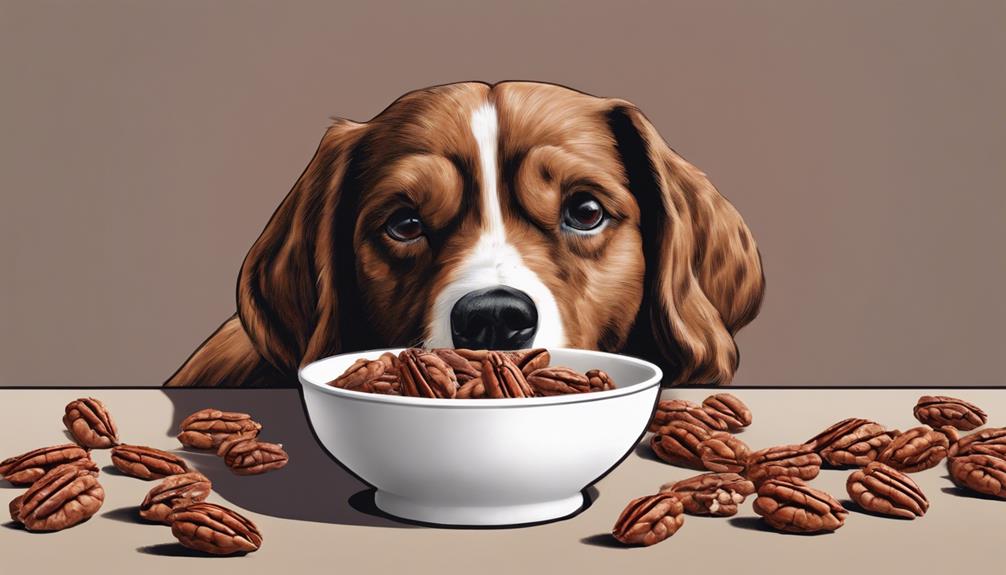
To prevent potential harm to our furry companions, avoiding pecans is vital due to their toxicity to dogs. Pecans contain juglone, a substance that can lead to gastrointestinal upset, pancreatitis, vomiting, seizures, and tremors in dogs.
Moldy pecans pose an additional risk as they may contain aflatoxin, which can result in severe neurological issues for our canine friends. It's essential to steer clear of feeding pecans to dogs to prevent digestive problems, pancreatitis, and potential blockages in their digestive tract.
If a dog accidentally ingests pecans, especially during holiday seasons when these nuts are more prevalent in households, immediate veterinary care is necessary. Being mindful of what our dogs consume can help safeguard their health and well-being.
Consulting a Veterinarian
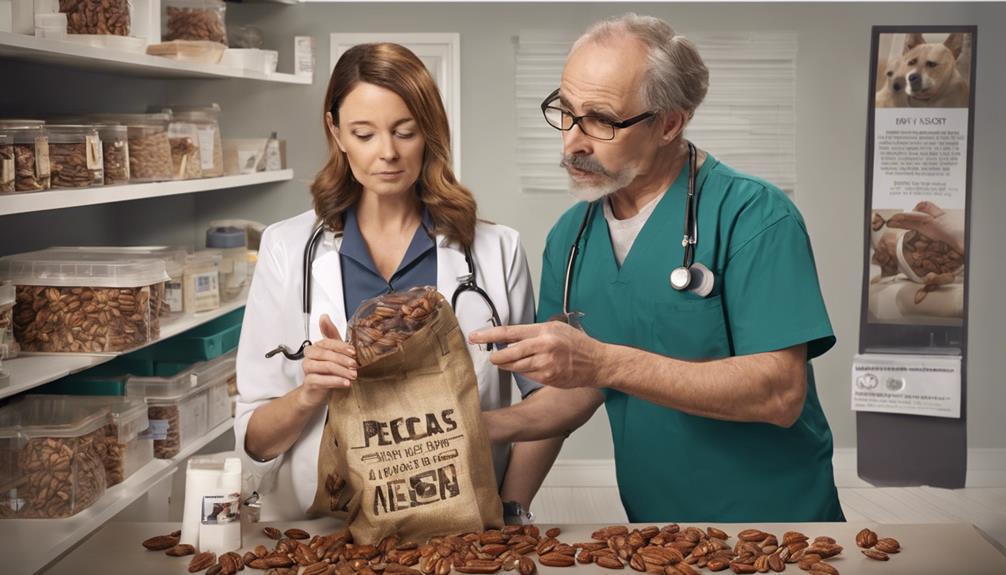
When considering the health of our furry companions in relation to pecans, seeking guidance from a veterinarian is vital for ensuring their safety and well-being. Consulting a veterinarian when it comes to pecans can provide you with personalized advice on whether pecans are safe for your dog.
Vets can help determine the potential risks and benefits of feeding pecans to your dog, guiding you on the symptoms to watch for if your dog ingests pecans. Additionally, veterinary professionals can offer recommendations on safe alternatives to pecans for your dog.
Ensuring the well-being and health of your dog is essential, and seeking advice from a vet is crucial in understanding the potential risks involved with pecans. Remember, when it comes to your furry friend's diet, a veterinarian's expertise can make all the difference in keeping them safe and healthy.
Frequently Asked Questions
What Happens if a Dog Eats Pecans?
If a dog eats pecans, it can lead to severe vomiting, gastrointestinal issues, and even pancreatitis due to the high-fat content.
Mold on pecans can contain toxic mycotoxins, causing tremors, seizures, and neurological problems in dogs.
Aflatoxin produced from mold on pecan shells is also toxic to dogs if ingested.
Even a small amount of pecans can make a dog very ill, necessitating immediate veterinary care.
What Nuts Are Not Good for Dogs?
When it comes to nuts that aren't good for dogs, it's important to be cautious. Pecans, walnuts, and macadamia nuts are a no-go for our furry friends due to their toxicity. Other nuts like almonds and hazelnuts can lead to tummy troubles in dogs.
Additionally, nuts like pistachios and cashews can pose a choking hazard. To keep our pups safe, it's best to avoid giving them any nuts and consult a vet before making dietary changes.
Can Dogs Eat Bananas?
Yes, dogs can eat bananas in moderation.
Bananas are a safe treat for dogs due to their low cholesterol and sodium levels. They contain potassium, fiber, and vitamins that can be beneficial in a balanced diet.
However, the high sugar content means bananas should only be given occasionally.
Always remember to remove the peel before offering banana slices to your furry friend to prevent choking hazards.
What Animals Eat Pecans?
Animals like squirrels, deer, raccoons, and turkeys enjoy munching on pecans in their natural habitats. Pecans serve as an essential food source for various wildlife species, providing necessary nutrients.
These creatures also aid in pecan tree reproduction by dispersing the seeds.
It's fascinating to observe how different animals interact with pecans in the wild, showcasing the intricate balance of nature's ecosystem.
Conclusion
To summarize, it's best to beware of feeding your furry friend pecans. The potential pitfalls of pecans for dogs include digestive distress, obesity risks, and even toxicity concerns.
Remember to consult your veterinarian before introducing any new foods to your dog's diet. Play it safe and steer clear of pecans to keep your pup healthy and happy.
Stay savvy and safeguard your pet's well-being!
